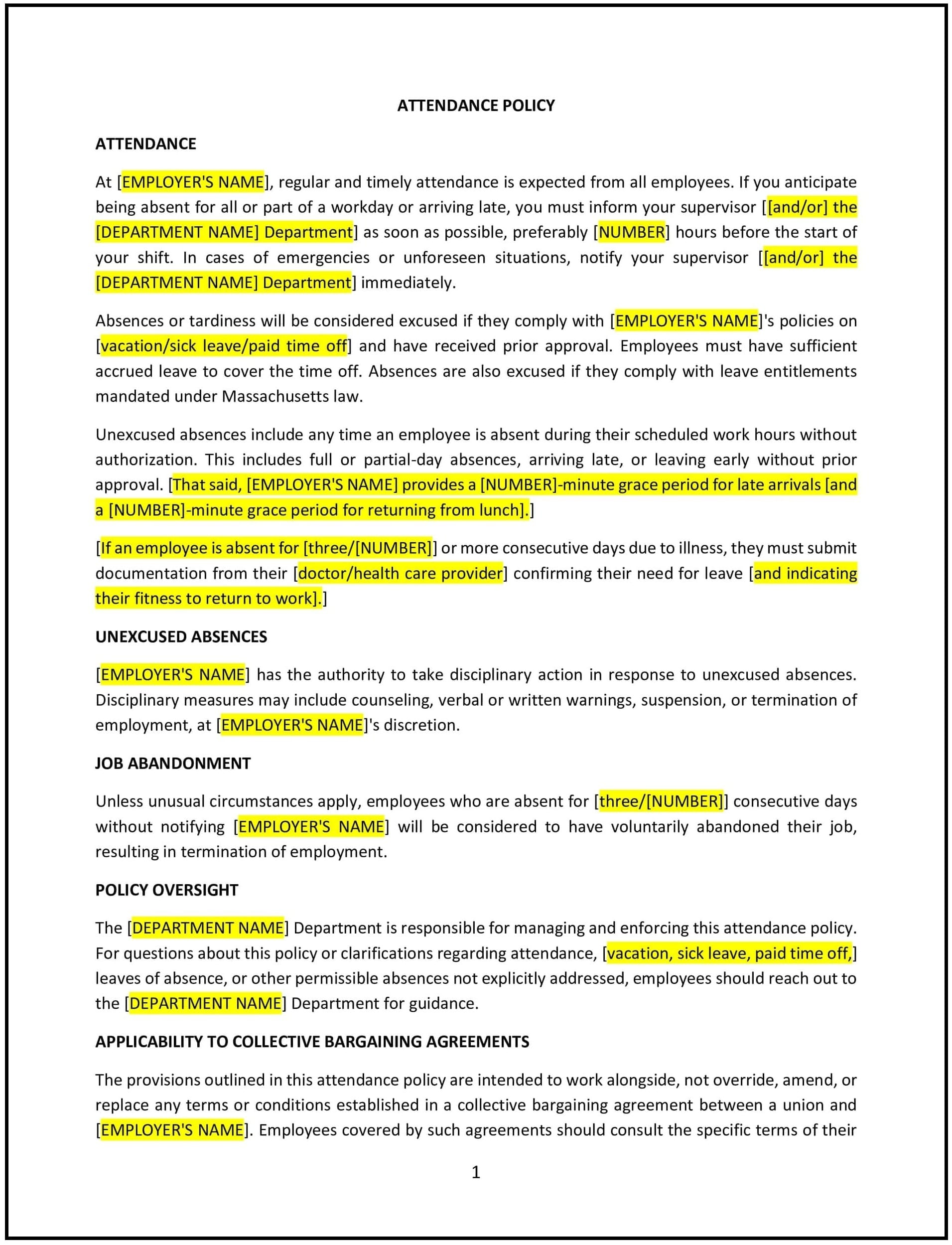Got contracts to review? While you're here for policies, let Cobrief make contract review effortless—start your free review now.

Customize this template for free
This attendance policy is designed to help Massachusetts businesses establish clear guidelines regarding employee attendance, punctuality, and reporting absences. The policy outlines expectations for attendance, the procedures for notifying supervisors about absences, and the consequences for excessive absenteeism or tardiness. It is designed to ensure that businesses can operate smoothly while maintaining fairness and consistency when addressing attendance issues.
By adopting this policy, businesses can promote a culture of accountability, reduce workplace disruptions, and ensure that employees are aware of their responsibilities regarding attendance.
How to use this attendance policy (Massachusetts)
- Define attendance expectations: Clearly define what constitutes acceptable attendance, including the company’s expectations for employees to report to work on time, attend scheduled shifts, and notify their supervisors in case of absence.
- Specify procedures for reporting absences: Outline the process employees must follow to report absences, including how much notice is required, whether absences should be reported via email, phone call, or an online system, and any required documentation (e.g., doctor’s note) for certain types of absences.
- Address acceptable reasons for absence: Specify which types of absences are considered acceptable, such as sick leave, personal leave, vacation days, or jury duty, and whether employees need to provide supporting documentation for these absences.
- Set guidelines for tardiness: Establish expectations regarding punctuality, including how late an employee can be before it is considered a violation of the attendance policy. The policy should include the consequences for habitual tardiness.
- Define excessive absenteeism: Specify what constitutes excessive absenteeism (e.g., more than a certain number of absences within a set period) and how the company will address excessive absenteeism, such as through progressive disciplinary actions.
- Address absenteeism due to medical conditions: Provide guidelines for employees who need to take extended time off due to a medical condition, including the process for requesting medical leave, whether it is paid or unpaid, and how long employees are allowed to be absent before further action is taken.
- Set consequences for attendance violations: Outline the disciplinary actions for employees who violate the attendance policy, including verbal or written warnings, suspension, or termination, depending on the frequency and severity of the violations.
- Accommodate for Massachusetts state laws: Ensure that the policy aligns with Massachusetts state laws, including the Massachusetts Sick Time Law, which provides employees with paid sick leave, and other relevant regulations governing employee attendance and leave.
Benefits of using this attendance policy (Massachusetts)
This policy offers several benefits for Massachusetts businesses:
- Promotes accountability: Clear attendance expectations and consequences for non-compliance help hold employees accountable for their time at work, reducing disruptions and ensuring business operations run smoothly.
- Increases productivity: When employees are aware of their attendance responsibilities, they are more likely to maintain punctuality and reduce absenteeism, leading to higher overall productivity.
- Reduces legal risks: A well-defined attendance policy helps businesses comply with Massachusetts state laws regarding employee leave, including sick leave, while protecting the company from potential legal challenges related to absenteeism.
- Enhances fairness: By applying the policy consistently to all employees, businesses ensure that attendance issues are handled equitably and that no employee is unfairly targeted or treated differently.
- Improves employee morale: Employees who understand the company’s attendance expectations and the consequences of not adhering to those expectations are more likely to feel that the workplace is organized and fair.
- Supports operational efficiency: By addressing attendance issues promptly and fairly, businesses can minimize the impact of absenteeism on operations, ensuring that employees are present and able to contribute to their work.
Tips for using this attendance policy (Massachusetts)
- Communicate the policy clearly: Ensure that all employees understand the attendance policy, including expectations for attendance, the procedures for reporting absences, and the consequences of violating the policy. This can be communicated during onboarding and through employee handbooks.
- Monitor attendance consistently: Regularly track employee attendance to identify patterns or issues with absenteeism or tardiness. Address any concerns early to prevent recurring problems.
- Offer flexibility when possible: While maintaining attendance expectations, consider offering flexibility for employees dealing with personal or family emergencies, medical conditions, or other special circumstances.
- Apply consequences fairly: Ensure that attendance-related disciplinary actions are applied consistently to all employees, taking into account any mitigating factors and adhering to progressive discipline practices.
- Review and update regularly: Periodically review the policy to ensure it is compliant with Massachusetts state laws, federal regulations, and the company’s evolving needs. Update the policy as needed to address any new requirements or operational changes.